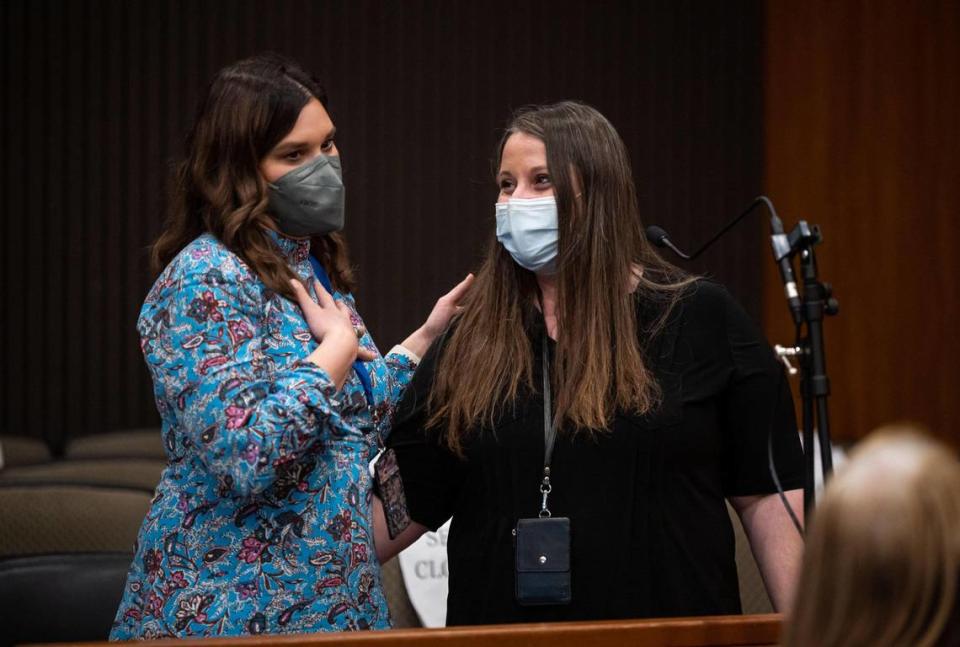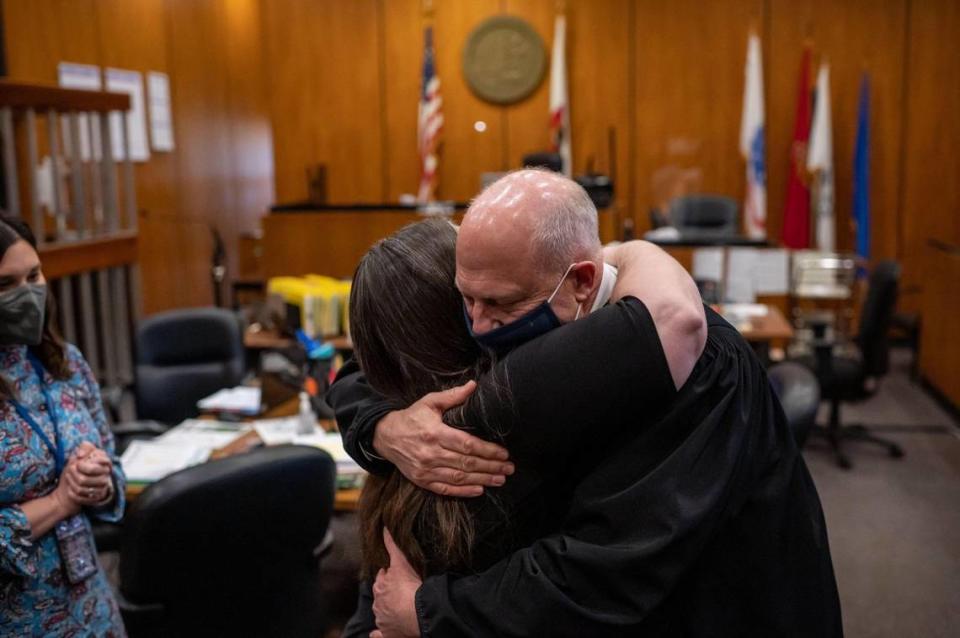Sacramento’s Collaborative Courts seek to help the mentally ill — not incarcerate them
A little more than two years ago, Shanie Phillips was arrested for second-degree burglary after she broke into an unlocked shed and began using the owner’s kitchen and barbecue to cook for herself.
Phillips, then 43, had been up for days, was high on meth and thought the house was hers, she said. In the middle of a schizophrenic episode exacerbated by her drug addiction, Phillips remembered searching the unlocked shed, going through what she imagined were her possessions. But Phillips was homeless and had been for years.
That night in January of 2020, like so many others she encountered on the street, she was lost — in every way imaginable. So it’s remarkable how far she’s come today with the help of an innovative Sacramento court system.
Opinion
Six years before the arrest, Phillips had lost her two young children, just 5 and 8, to the foster care system, and she hadn’t seen them since. They were growing up in Missouri without her.
On the night of the burglary, Phillips was homeless, alone and hallucinating, and she had already been arrested once before on a drug-related assault charge. When the owners of the shed woke up, they called the police, and Phillips was arrested. It was her second strike under state law, carrying a mandatory sentence of three years in prison.
One year and 363 days later, Phillips stood once more in a Sacramento County courtroom, but this time, the mood was very different — and someone had brought cookies.
That’s because it was graduation day.

“Shanie is the epitome of ‘Pray to God, but row the boat,’” Sacramento County Assistant Public Defender Addie Young said, smiling through tears and hugging Phillips’ side. Young asked Superior Court Judge Lawrence Brown to clear Phillips’ guilty plea to the 2020 charge and strike her arrest from the record.
Deputy District Attorney Chris Carlson agreed based on Phillips’ record of participation in treatment, the judge so moved, and the whole court — attorneys, fellow graduates and even the bailiff — cheered and clapped for the woman who had so dramatically turned her life around.
Brown said Phillips is “a shining example of why we have these courts.” She completed the program with distinction in just 11 months and is now working as a drug and alcohol counselor for WellSpace in Sacramento. Specifically, she’s helping mothers who are on the verge of losing their own children so that they never have to go through the pain she’s felt every day of the last eight years.
Unlike its traditional counterparts, Sacramento County’s Mental Health Court is designed for people diagnosed with mental illnesses that have had a significant impact on their lives. Many of the people going through the system have schizophrenia, anxiety and severe depression. Mental health court was created to ease prison and jail crowding by getting people like Phillips into treatment instead of custody.
It’s a wonderful program, but not everyone qualifies. To be referred, a candidate must not be considered a safety risk. Their crimes must not be violent or sexual in nature, Brown said.
Clients must enter a guilty plea that is dismissed upon graduation within Sacramento’s three mental health courts. At any given time, there are about 150 to 175 people working their way through a yearlong treatment program that includes therapy, shelter and consistent medication and support.
The Collaborative Courts system was instituted in 2007 and includes the Mental Health Court, Homeless Court, Drug Court and Veterans Court, among others. Forty-four counties across the state have an adult mental health treatment court, according to the Judicial Council of California. More than 700 clients were seen in Sacramento’s Collaborative Court system in 2021.
According to Sacramento Collaborative Courts, the county criminal justice system saved $6,000 per client in its first year of operation. The program is a collaboration of the District Attorney’s Office, probation, the courts, the Public Defender’s Office, and the county health department.
The mental health court places clients on probation with conditions that include a treatment plan and avoidance of alcohol and illegal drugs. They must appear in court every week and follow their treatment plans or risk losing their probation status and going to jail. After living under the supervision of the court for at least a year, clients graduate from the system and their cases are dismissed, often leading to jobs and housing that many didn’t have before.
“Anybody in my mental health courts will be connected to housing before they get released,” Brown said. And at their first hearing, they are given a 30-day supply of necessary medications and an address where they can find shelter. As long as the clients finish their program, the charges are wiped clean from their record without jail time.

“Court is traditionally an adversarial system … with the judge serving as umpire,” Brown said. “In Collaborative Courts, everyone works together with a shared goal of treatment and recovery.”
Too often, people struggling with mental illness are overlooked and undiagnosed while incarcerated. Decades of failed mental health policy have put police on the front line of mental health care, which often leads to criminalization of those suffering from debilitating mental health issues, violence instead of intervention and prisons as modern-day asylums.
According to a 2015 study by the Treatment Advocacy Center, people with untreated mental illness are 16 times more likely than other Americans to be killed during a police encounter than other civilians. The study found that people with mental illness are involved in at least one in four fatal police shootings even though they number fewer than one in 50 adults.
The share of incarcerated Californians with an active mental health case rose from 19 percent in 2009 to 31 percent in 2019, according to an analysis by the Sacramento-based consulting firm California Health Policy Strategies.
Judge Brown said he wants people to understand that the criminal justice system, while flawed, is also filled with people who want the best for their clients.

Phillips called Brown and his court “an absolute godsend.” Now that her record is clear, she’s working on bringing her two children — now 13 and 16 — back to Sacramento and home again with their mother.
“My life is completely different,” Phillips said. “If (Mental Health Court) hadn’t happened for me, I would have ended up right back out on the street and in the same situation.”
More than half of Americans will experience a mental health disorder at some point, and one in five will experience one this year. What is strange is not those experiencing mental health crises but rather society’s constant rejection of such a common diagnosis. People living with mental health struggles are you, they are me and they are the people we see and interact with every day.
If a system like the Collaborative Courts can support and mend and strengthen a life like Phillips’, then it should give us all great hope that maybe, finally, our society is creating new ways to throw off the stigma of mental illness that once kept us so silent and ashamed.
A previous version of this article incorrectly stated the supply of medication a client is given after their first hearing.

 Yahoo Movies
Yahoo Movies 
